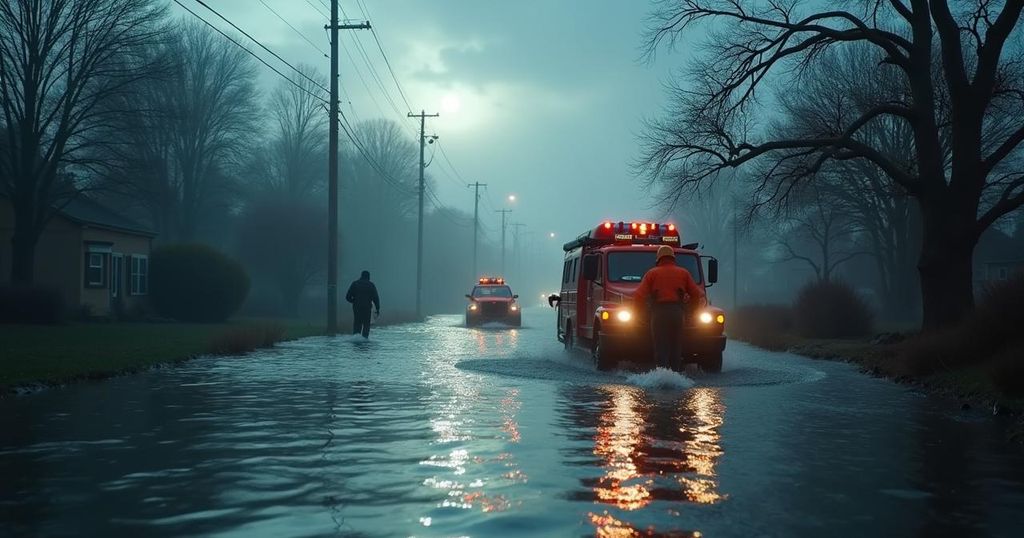Hurricane Helene has devastated the U.S. Gulf Coast, resulting in over 190 fatalities across six states. Search and rescue operations are ongoing, with President Biden directing military support for recovery efforts. North Carolina has been particularly impacted, with many areas isolated due to catastrophic flooding. As fatalities continue to rise, harrowing personal accounts have emerged from the affected communities.
Search and rescue teams are urgently working to locate and assist survivors of the catastrophic effects of Hurricane Helene, which struck the U.S. Gulf Coast a week ago, resulting in significant flooding and destruction in multiple states. The hurricane, now listed among the deadliest to hit the mainland U.S. in over half a century, has claimed more than 190 lives across Florida, Georgia, South Carolina, North Carolina, Virginia, and Tennessee. Federal support is underway; President Joe Biden announced the deployment of 1,000 active-duty military personnel to contribute to recovery efforts, focusing primarily on the provision of essential supplies such as food and water. Addressing emergency management officials in North Carolina, President Biden stated, “I don’t have to tell this group that Hurricane Helene has been a storm of historic proportions. The damage is still being assessed, but many people are still unaccounted for. So, I’m here to say, the United States – the nation – has your back.” Rescue efforts are particularly critical in western North Carolina, where catastrophic flooding has obliterated transportation infrastructure, isolating communities and complicating relief operations. Reports indicate that 192 fatalities have been confirmed, with many individuals remaining unaccounted for as rescuers continue to access previously unreachable areas. The Buncombe County region, notably Asheville, has experienced the heaviest loss of life, with heart-wrenching accounts emerging from the area, including the tragic story of a mother who lost her son to the floodwaters while also suffering the loss of her parents. Hurricane Helene made landfall as a Category 4 storm, causing massive destruction along Florida’s Big Bend coastline before moving northeast and causing further devastation in Georgia and the Carolinas. As the storm transitioned into a tropical system, harrowing conditions persisted, leading to fatalities and extensive property damage. In Tennessee, flood-related investigations are underway following the disappearance of several employees from Impact Plastics amidst torrential rains. The continuing impact of Helene has prompted public health advisories in Tennessee due to compromised wastewater treatment systems, warning residents to avoid contact with affected bodies of water. The advisory was necessitated by the potential contamination resulting from the flooding event. As cities grapple with the storm’s aftermath, the full extent of Helene’s damage and the rising death toll remain under assessment. Emergency responders are racing against time to save lives, provide aid, and restore some semblance of normalcy to devastated communities.
Hurricane Helene has emerged as one of the deadliest storms in American history, ranking second only to Hurricane Katrina in terms of fatalities in the last 55 years. Following its landfall on the Gulf Coast, Helene unleashed catastrophic flooding, claiming lives and causing widespread destruction across six states. The ensuing humanitarian crisis necessitated immediate federal intervention and has led to vast rescue and recovery efforts in affected areas, particularly in North Carolina where infrastructure has been severely compromised. The storm serves as a stark reminder of the vulnerabilities faced by communities in the wake of powerful hurricanes, underscoring the need for robust disaster preparedness and response mechanisms.
In summary, Hurricane Helene has wrought unprecedented havoc across the southeastern United States, leading to over 190 confirmed deaths and a significant humanitarian crisis. Swift military support has been mobilized to assist in recovery operations, particularly in areas severely affected by flooding and destruction. The tragedy has highlighted the resilience and vulnerability of communities facing the daunting realities of natural disasters. As search and rescue efforts continue, the nation stands united in its support of the affected regions while more victims and tragedies are likely to emerge in the ongoing aftermath.
Original Source: nypost.com







